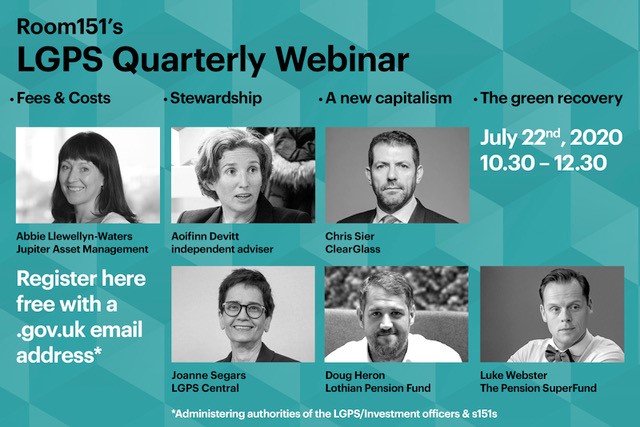
The UK risks a severe economic contraction following the pandemic and lockdown. That’s no reason for LGPS to ignore enforcing good governance and sustainability principles, argues Doug McMurdo.
All of us involved in, and around, local government are acutely aware of the devastating impact of coronavirus. Local residents have tragically had their lives cut short, services have had to adapt at lightning speed and the financial pressures are severe. These challenges are, of course, not confined to local authorities—change the word “residents” for “employees” and that last sentence applies equally to the private sector.
As chair of the Local Authority Pension Fund Forum, I have met with executives at global companies, who our LGPS members are invested in, to discuss the challenges they face. The economic downturn is set to be severe—the deepest in 300 years, according to the Bank of England.
In recent weeks we have seen major companies, in the full glare of publicity, turn to the markets to raise capital, furloughing staff, and suspending dividend payments. Some will make significant losses; others will be fighting for their survival.
However, winning this short-term fight for survival should not come at the expense of corporate governance standards, nor need it. High standards of corporate governance and corporate responsibility go hand in glove with sustainable long-term returns.

Fair weather
Investors have seen time and again the financial costs that companies, and therefore their shareholders, pay when corporate standards fall short. The price of fines, damage to reputations and poor business decisions can run into the billions. And for some companies it can spell their downfall.
Being a fair weather friend to the central principles of responsible investment makes little sense in the short term either. The impact of coronavirus and the sacrifices we, as individuals, have all made are set to mean heightened scrutiny of the way major companies behave. This demands that the best and most adaptable business leaders are in place while ensuring proper oversight of decisions by an effective board.
The risks in the current environment are both numerous and serious. Excessive executive pay when a company’s, and the nation’s workforce, are taking pay cuts is unlikely to bolster a company’s standing. It would take a particularly short memory to forget the fallout at RBS during the previous recession.
Failing to enforce rigorous health and safety standards to protect the workforce not only impacts on employees directly but has immediate reputational and operational implications. Investor, government and public support could hinge on companies meeting their social obligations, including around corporate tax.
Equally, paying large dividends while receiving government support is likely to stick in the craw of the tax payer. Just as serious questions will be asked when share buybacks are followed by a company immediately turning to the market to raise cash. Successfully navigating such a minefield of risks may not be straightforward. However, the safest route will be considerably clearer if robust governance structures and policies are in place.
Founations
The economic crisis is also giving us a taste of what might be to come and why investors pushing for better standards now will lay the foundation for economic recovery and achieving common longer-term objectives.
Mass redundancies and furloughing of millions of jobs shows the importance of planning for and implementing a just transition to a net zero carbon emissions economy now.
The industrial restructuring needed to meet our national climate change obligations will see some sectors, communities and sections of the workforce affected more than others. This is true more broadly of the impact of disruptive technology, and we are currently witnessing the rapid acceleration of online work and operations to the detriment of some industries.
Ensuring companies play their part in listening to and supporting communities through periods of change, should not just be part of a director’s duty to consider the interests of employees and stakeholders, but is also critical for a company’s long-term reputation.
It is also essential that companies take stakeholders with them when seeking to reduce emissions or make fundamental operational changes to increase value creation. Failure to do so will ultimately undermine these goals. While for investors, overlooking these issues and not engaging companies now will simply delay progress when time is not on our side.
This is of course not the first downturn. Nor will it be the last. Over the decades, through several recessions and stock market crashes, the Forum, alongside other responsible investors, has continued to make the case that long-term value creation is best achieved through maintaining the highest standards of corporate governance and corporate responsibility. The Forum has not backed away from asking tough questions in tough times. It has built strong relationships with companies and achieved real change by doing so in a constructive way.
Now is certainly not the time for responsible investors to turn our backs on our principles. Sure, we need to be sensitive to market conditions. This is true in good times when companies can still struggle. But this does not negate our obligations. The stakes are too high. Millions of current and future beneficiaries of the LGPS are still relying on sustainable business practices to deliver long-term shareholder returns for their retirement.
Doug McMurdo, chair of the Local Authority Pension Fund Forum.
FREE monthly and weekly newsletters
Subscribe to Room151 Newsletters
Monthly Online Treasury Briefing
Sign up here with a .gov.uk email address
Room151 Webinars
Visit the Room151 channel













